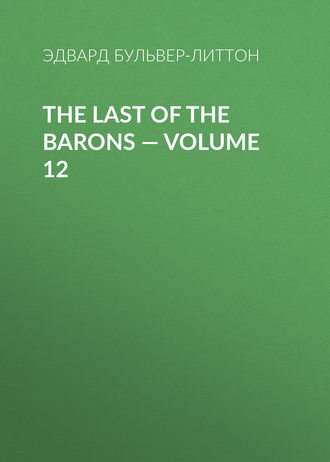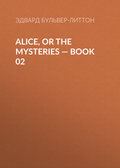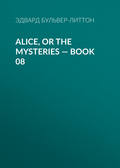
Эдвард Бульвер-Литтон
The Last of the Barons — Volume 12
A strong guard was at once despatched to the Tower with the friar himself, followed by a covered wagon, which was to serve for conveyance to Bungey and his victim.
In the mean while, Sibyll, after remaining for some time in the chamber which Hastings had abandoned to her solitary woe, had passed to the room in which her father held mute commune with his Eureka.
The machine was now thoroughly completed,—improved and perfected, to the utmost art the inventor ever could attain. Thinking that the prejudice against it might have arisen from its uncouth appearance, the poor philosopher had sought now to give it a gracious and imposing appearance. He had painted and gilt it with his own hands; it looked bright and gaudy in its gay hues; its outward form was worthy of the precious and propitious jewel which lay hidden in its centre.
"See, child, see!" said Adam; "is it not beautiful and comely?"
"My dear father, yes!" answered the poor girl, as still she sought to smile; then, after a short silence, she continued, "Father, of late, methinks, I have too much forgotten thee; pardon me, if so. Henceforth, I have no care in life but thee; henceforth let me ever, when thou toilest, come and sit by thy side. I would not be alone,—I dare not! Father, Father! God shield thy harmless life! I have nothing to love under heaven but thee!"
The good man turned wistfully, and raised, with tremulous hands, the sad face that had pressed itself on his bosom. Gazing thereon mournfully, he said, "Some new grief hath chanced to thee, my child. Methought I heard another voice besides thine in yonder room. Ah, has Lord Hastings—"
"Father, spare me! Thou wert too right; thou didst judge too wisely. Lord Hastings is wedded to another! But see, I can smile still, I am calm. My heart will not break so long as it hath thee to love and pray for!"
She wound her arms round him as she spoke, and he roused himself from his world out of earth again. Though he could bring no comfort, there was something, at least, to the forlorn one, in his words of love, in his tears of pity.
They sat down together, side by side, as the evening darkened,—the Eureka forgotten in the hour of its perfection! They noted not the torches which flashed below, reddened at intervals the walls of their chamber, and gave a glow to the gay gilding and bright hues of the gaudy model. Yet those torches flickered round the litter that was to convey Henry the Peaceful to the battlefield, which was to decide the dynasty of his realm! The torches vanished, and forth from the dark fortress went the captive king.
Night succeeded to eve, when again the red glare shot upward on the Eureka, playing with fantastic smile on its quaint aspect. Steps and voices, and the clatter of arms, sounded in the yard, on the stairs, in the adjoining chamber; and suddenly the door was flung open, and, followed by some half score soldiers, strode in the terrible friar.
"Aha, Master Adam! who is the greater nigromancer now? Seize him! Away! And help you, Master Sergeant, to bear this piece of the foul fiend's cunning devising. Ho, ho! see you how it is tricked out and furbished up,—all for the battle, I warrant ye!"
The soldiers had already seized upon Adam, who, stupefied by astonishment rather than fear, uttered no sound, and attempted no struggle. But it was in vain they sought to tear from him Sibyll's clinging and protecting arms. A supernatural strength, inspired by a kind of superstition that no harm could chance to him while she was by, animated her slight form; and fierce though the soldiers were, they shrunk from actual and brutal violence to one thus young and fair. Those small hands clung so firmly, that it seemed that nothing but the edge of the sword could sever the child's clasp from the father's neck.
"Harm him not, harm him at your peril, friar!" she cried, with flashing eyes. "Tear him from me, and if King Edward win the day, Lord Hastings shall have thy life; if Lord Warwick, thy days are numbered, too. Beware, and avaunt!"
The friar was startled. He had forgotten Lord Hastings in the zest of his revenge. He feared that, if Sibyll were left behind, the tale she might tell would indeed bring on him a powerful foe in the daughter's lover; on the other hand, should Lord Warwick get the better, what vengeance would await her appeal to the great protector of her father! He resolved, therefore, on the instant, to take Sibyll as well as her father; and if the fortune of the day allowed him to rid himself of Warner, a good occasion might equally occur to dispose forever of the testimony of Sibyll. He had already formed a cunning calculation in desiring Warner's company; for while, should Edward triumph, the sacrifice of the hated Warner was resolved upon, yet, should the earl get the better, he could make a merit to Warner that he (the friar) had not only spared, but saved, his life, in making him his companion. It was in harmony with this double policy that the friar mildly answered to Sibyll,—
"Tusk, my daughter! Perhaps if your father be true to King Edward, and aid my skill instead of obstructing it, he may be none the worse for the journey he must take; and if thou likest to go with him, there's room in the vehicle, and the more the merrier. Harm them not, soldiers; no doubt they will follow quietly."
As he said this, the men, after first crossing themselves, had already hoisted up the Eureka; and when Adam saw it borne from the room, he instinctively followed the bearers. Sibyll, relieved by the thought that, for weal or for woe, she should, at least, share her father's fate, and scarce foreboding much positive danger from the party which contained Hastings and Alwyn, attempted no further remonstrance.
The Eureka was placed in the enormous vehicle,—it served as a barrier between the friar and his prisoners.
The friar himself, as soon as the wagon was in motion, addressed himself civilly enough to his fellow-travellers, and assured them there was nothing to fear, unless Adam thought fit to disturb his incantations. The captives answered not his address, but nestled close to each other, interchanging, at intervals, words of comfort, and recoiling as far as possible from the ex-tregetour, who, having taken with him a more congenial companion in the shape of a great leathern bottle, finally sunk into the silent and complacent doze which usually rewards the libations to the Bromian god.
The vehicle, with many other baggage-wagons in the rear of the army in that memorable night-march, moved mournfully on; the night continued wrapped in fog and mist, agreeably to the weatherwise predictions of the friar. The rumbling groan of the vehicle, the tramp of the soldiers, the dull rattle of their arms, with now and then the neigh of some knight's steed in the distance, were the only sounds that broke the silence, till once, as they neared their destination, Sibyll started from her father's bosom, and shudderingly thought she recognized the hoarse chant and the tinkling bells of the ominous tymbesteres.
CHAPTER III.
A PAUSE
In the profound darkness of the night and the thick fog, Edward had stationed his men at a venture upon the heath at Gladsmoor, [Edward "had the greater number of men."—HALL, p. 296.] and hastily environed the camp with palisades and trenches. He had intended to have rested immediately in front of the foe, but, in the darkness, mistook the extent of the hostile line; and his men were ranged only opposite to the left side of the earl's force (towards Hadley), leaving the right unopposed. Most fortunate for Edward was this mistake; for Warwick's artillery, and the new and deadly bombards he had constructed, were placed on the right of the earl's army; and the provident earl, naturally supposing Edward's left was there opposed to him, ordered his gunners to cannonade all night. Edward, "as the flashes of the guns illumined by fits the gloom of midnight, saw the advantage of his unintentional error; and to prevent Warwick from discovering it, reiterated his orders for the most profound silence." [Sharon Turner.] Thus even his very blunders favoured Edward more than the wisest precautions had served his fated foe.
Raw, cold, and dismal dawned the morning of the fourteenth of April, the Easter Sabbath. In the fortunes of that day were involved those of all the persons who hitherto, in the course of this narrative, may have seemed to move in separate orbits from the fiery star of Warwick. Now, in this crowning hour, the vast and gigantic destiny of the great earl comprehended all upon which its darkness or its light had fallen: not only the luxurious Edward, the perjured Clarence, the haughty Margaret, her gallant son, the gentle Anne, the remorseful Isabel, the dark guile of Gloucester, the rising fortunes of the gifted Hastings, —but on the hazard of that die rested the hopes of Hilyard, and the interests of the trader Alwyn, and the permanence of that frank, chivalric, hardy, still half Norman race, of which Nicholas Alwyn and his Saxon class were the rival antagonistic principle, and Marmaduke Nevile the ordinary type. Dragged inexorably into the whirlpool of that mighty fate were even the very lives of the simple Scholar, of his obscure and devoted child. Here, into this gory ocean, all scattered rivulets and streams had hastened to merge at last.
But grander and more awful than all individual interests were those assigned to the fortunes of this battle, so memorable in the English annals,—the ruin or triumph of a dynasty; the fall of that warlike baronage, of which Richard Nevile was the personation, the crowning flower, the greatest representative and the last,—associated with memories of turbulence and excess, it is true, but with the proudest and grandest achievements in our early history; with all such liberty as had been yet achieved since the Norman Conquest; with all such glory as had made the island famous,—here with Runnymede, and there with Cressy; the rise of a crafty, plotting, imperious Despotism, based upon the growing sympathy of craftsmen and traders, and ripening on the one hand to the Tudor tyranny, the Republican reaction under the Stuarts, the slavery, and the civil war, but on the other hand to the concentration of all the vigour and life of genius into a single and strong government, the graces, the arts, the letters of a polished court, the freedom, the energy, the resources of a commercial population destined to rise above the tyranny at which it had first connived, and give to the emancipated Saxon the markets of the world. Upon the victory of that day all these contending interests, this vast alternative in the future, swayed and trembled. Out, then, upon that vulgar craving of those who comprehend neither the vast truths of life nor the grandeur of ideal art, and who ask from poet or narrator the poor and petty morality of "Poetical Justice,"—a justice existing not in our work-day world; a justice existing not in the sombre page of history; a justice existing not in the loftier conceptions of men whose genius has grappled with the enigmas which art and poetry only can foreshadow and divine,—unknown to us in the street and the market, unknown to us on the scaffold of the patriot or amidst the flames of the martyr, unknown to us in the Lear and the Hamlet, in the Agamemnon and the Prometheus. Millions upon millions, ages upon ages, are entered but as items in the vast account in which the recording angel sums up the unerring justice of God to man.
Raw, cold, and dismal dawned the morning of the fourteenth of April. And on that very day Margaret and her son, and the wife and daughter of Lord Warwick, landed, at last, on the shores of England. [Margaret landed at Weymouth; Lady Warwick, at Portsmouth.] Come they for joy or for woe, for victory or despair? The issue of this day's fight on the heath of Gladsmoor will decide. Prank thy halls, O Westminster, for the triumph of the Lancastrian king,—or open thou, O Grave, to receive the saint-like Henry and his noble son. The king-maker goes before ye, saint-like father and noble son, to prepare your thrones amongst the living or your mansions amongst the dead!







